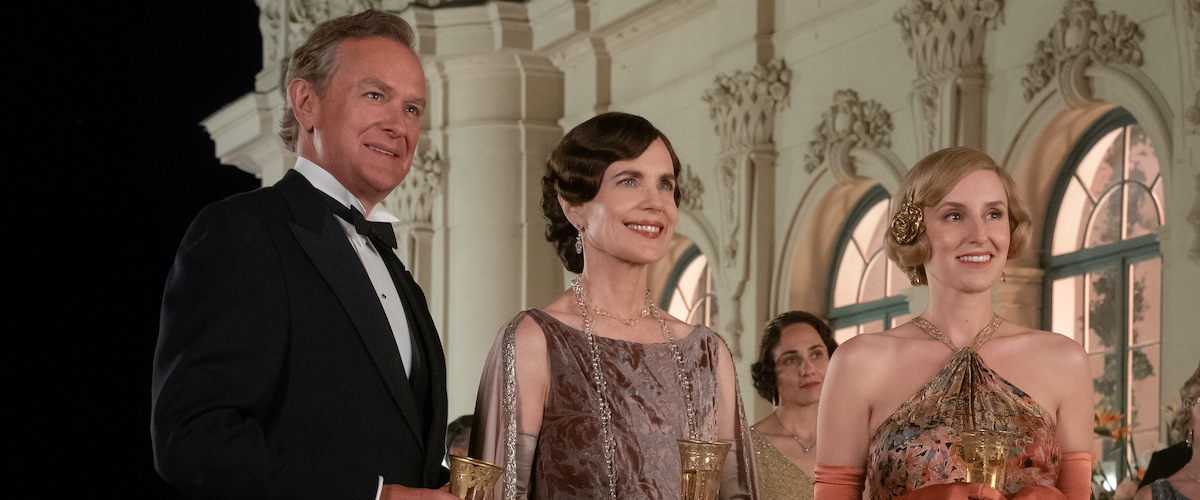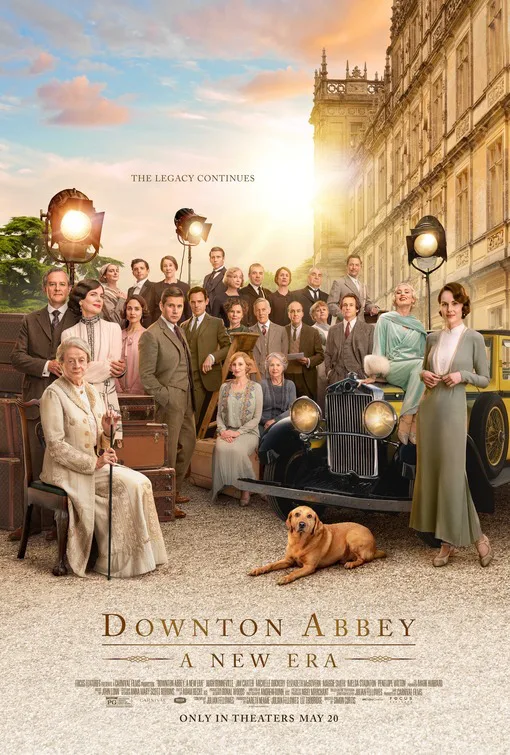The ITV series “Downton Abbey” that started this all ran for six seasons with a total of 52 episodes. A multi-generational high-end British soap opera centered on the title location, its aristocrat masters, and its loyal servants, it boasted a massive cast playing characters acting out all manner of intrigue, experiencing the joys and sorrows of having it pretty good in the early 20th century. 2019 brought a film, as the series had ended, and now we have another film, one heralding, well, you can read the title.
My point, inasmuch as I have one, is that a lot has happened in this saga. In recognition of this, “Downton Abbey: A New Era” begins with Kevin Doyle, who plays the role of butler-turned-schoolteacher Molesley, directly addressing the audience and giving them a little catch-up. This feels kinda goofy, because it is. On the other hand, in space operas the catch-up is usually done via a printed crawl and for this recap a printed crawl might well achieve Proustian lengths. Anyway. I found the whole thing a trifle gratuitous because while the preamble is pretty good about the who’s-who, the two plot threads that push this movie are relatively unrelated to what’s gone before.
Thread one: Maggie Smith’s Violet, the LITERAL Dowager Countess of the Abbey and mother to its much-put-upon Earl, Robert (Hugh Bonneville) is told that she’s been willed a whole villa in the South of France by an old acquaintance. Very old—they last saw each other in the 1860s, and it’s about 1928 now. A large portion of the family is invited to check the place out and there’s some apprehension that the relatives of the old acquaintance might not want to give up the joint. So Robert, American-born wife Cora (Elizabeth McGovern), and Robert’s very proper butler Carson (Jim Carter) embark to Nice or thereabouts.
They’re glad to be traveling because a film crew is going to take over the Abbey for a month. All the upper-crusters, and Carson, shudder at the prospect of hosting vulgar “kinema” people, but the servants are all over it. The production is paying a handsome fee, and as Lady Mary (Michelle Dockery), one of Robert’s daughters, who runs the place, points out, the roof can use fixing and money’s currently too tight to mention. So in come the moviemakers: handsome director Jack Barber (a game Hugh Dancy), dashing leading man Guy (Dominic West), and stuck-up glamourpuss Myrna (Laura Haddock). While Guy speaks in very rounded, plummy tones, Myrna, her attitude notwithstanding, has a right Cockney honk. You can see where this thread is going.
Well if you can’t, more power to you maybe. But if you’re part of this franchise’s core demo you surely remember (spoiler alert?) “Singin' in the Rain.” Julian Fellowes’ script cribs from that classic, so shamelessly that it’s rather endearing. Meanwhile, in the South of France, Nathalie Baye—onetime partner of Johnny Hallyday, two-time collaborator with Godard, three-time collaborator with Truffaut—glowers as a widow who indeed wants these Brits off of her villa lawn. And even as she glowers, Robert and company try to unlock the mystery of why the villa was willed to Violet in the first place.
Like I said—pretty standalone stuff. Nevertheless, the movie also advances a lot of the individual or dual storylines of beloved characters looking for fulfillments, mostly of the romantic kind. Director Simon Curtis and editor Adam Recht deserve a lot of credit for packing a helluva lot of story into a picture that’s only a hair over 120 minutes, including that preamble.
It would be a little cruel to call the world of “Downton Abbey” the Marvel Cinematic Universe for the senior set. But it wouldn’t be entirely inaccurate. I’m almost eligible to collect Social Security myself, so I can say it. In any event, this film represents an excellent job of fan service on several levels. All these characters are convincingly acted, of course they are. I mentioned the handling of the storylines. And the movie is really pleasant to look at. Hard truths about British weather notwithstanding, it’s always sunny at Downton Abbey, and it’s sunnier still in the South of France. People who complain about how movies are so literally dark nowadays (and mostly these people are old) (and again, I can say that) should turn out in force to check this out. It’s like having a veil lifted from your eyes.
Now playing only in theaters.




















